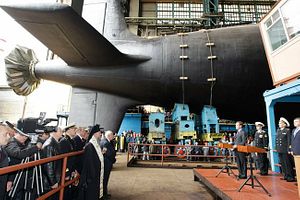New details have emerged on Russia’s development of a new fifth generation class of nuclear-powered submarines.
The yet-to-be-named class will be divided up into “underwater interceptor” and “aircraft carrier killer” vessels, the Moscow Times reports quoting the head of the state-owned United Shipbuilding Corporation’s state defense order department, Anatoly Shlemov.
“The main purpose of the [underwater interceptor] is to protect groups of [ballistic] missile carrying submarines, and to battle with enemy submarines. The second ship will be a cruise missile carrier [used] for defeating coastal and surface targets,” Shlemov stated.
Very little other information is available about the likely features of Russia’s fifth generation submarine. Back in 2013, the Malakhit Marine Engineering Design Bureau in St. Petersburg announced that it will be equipped with new stealth features, new noise reduction technology, automated control systems, reactor safety, and long-range weapons.
Vladimir Dorofeyev, CEO of Malakhit Marine Engineering Design Bureau, said in an interview in June that the new class of submarines will be based on a “network-centric system.” He also noted that not everything will be revolutionary new technology: “The reactor [of the submarines] will be certainly based on new principles, but there will be no revolution, and it is not needed after all.”
He is also paraphrased as saying that the “boats’ dimensions and speed, although remaining significant parameters, will cease to be of prime importance.” Furthermore, Dorofeyev emphasized that production of the new submarine class will only begin once construction of all Yasen-class multi-purpose attack nuclear submarines (SSGN) will be completed.
As emphasized in June (see: “Groundhog Day: ‘Russia Developing 5th Generation Sub’”):
[W]aiting for the completion of the Yasen project could take a while. The 13,800-ton, 390-foot longand highly automated Yasen-class of Russian attack submarines was supposed to replace older Soviet-era multi-purpose nuclear submarine models by 2020.
Yet, the exorbitant costs of the submarines — estimated to be twice as much as the new Borei-class SSBNs – has so far led only to the commissioning of one out of eight SSGNs, with a further three to four vessels likely to be completed by 2020.
I also noted in my previous article that periodic announcements by Russia’s shipbuilding industry that it is working on a next-generation submarine have been made repeatedly over the past couple of years, but the question remains whether Russia can deliver.
Norman Friedman, an American naval analyst is skeptical in an interview quoted in Defense News:
I would be skeptical.There’s a history in that country of laying down things that don’t get finished for a long time. No question they’ll lay down the subs, but actually building them after that is a more interesting question. (…) I get the feeling for all the big talk from the Russians about building a new fleet, they’re probably having trouble getting stuff (…).
He also notes that a lot of expertise in Russia’s shipbuilding industry has gone missing: “A lot of people quit the yards. (…) If they lost a lot of their smarter people, there’s a difficulty in recreating what they had. Coming back 15 years later and trying to recreate it is kind of dubious.”
This concurs with what I said yesterday (see: “Is Russia’s Nuclear-Capable Sub Killer Helicopter Making a Comeback?”):
Like with any other defense procurement news coming out of Russia these days, two principal questions will have to be answered in order to assess the feasibility of this new project. First, where would the money be coming from for this ambitious new building program? Second, will the Russian defense industry have enough skilled workers to be able to do all the legwork necessary to transform this ambitious plan into a reality?
































